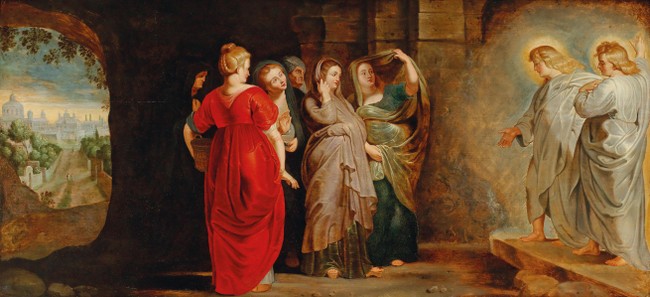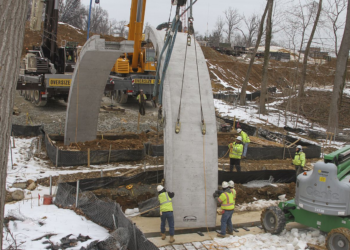
May all of our readers have a happy and blessed Easter celebration today! We would also like to wish our Jewish readers a belated blessed Passover, which took place a week ago.
Tonight’s Gospel reading from the Easter Vigil is Luke 24:1–12, when the women come across the empty tomb and are the first to be told its implications:
At daybreak on the first day of the week the women who had come from Galilee with Jesus took the spices they had prepared and went to the tomb. They found the stone rolled away from the tomb; but when they entered, they did not find the body of the Lord Jesus. While they were puzzling over this, behold, two men in dazzling garments appeared to them. They were terrified and bowed their faces to the ground. They said to them, “Why do you seek the living one among the dead? He is not here, but he has been raised. Remember what he said to you while he was still in Galilee, that the Son of Man must be handed over to sinners and be crucified, and rise on the third day.” And they remembered his words.
Then they returned from the tomb and announced all these things to the eleven and to all the others. The women were Mary Magdalene, Joanna, and Mary the mother of James; the others who accompanied them also told this to the apostles, but their story seemed like nonsense and they did not believe them. But Peter got up and ran to the tomb, bent down, and saw the burial cloths alone; then he went home amazed at what had happened.
Later today, we also hear the same scene from John 20:1-9, where John joins Peter at the tomb. The testimony is somewhat different, but the message is the same:
On the first day of the week, Mary of Magdala came to the tomb early in the morning, while it was still dark, and saw the stone removed from the tomb. So she ran and went to Simon Peter and to the other disciple whom Jesus loved, and told them, “They have taken the Lord from the tomb, and we don’t know where they put him.” So Peter and the other disciple went out and came to the tomb. They both ran, but the other disciple ran faster than Peter and arrived at the tomb first; he bent down and saw the burial cloths there, but did not go in. When Simon Peter arrived after him, he went into the tomb and saw the burial cloths there, and the cloth that had covered his head, not with the burial cloths but rolled up in a separate place. Then the other disciple also went in, the one who had arrived at the tomb first, and he saw and believed. For they did not yet understand the Scripture that he had to rise from the dead.
Finally, we go back to Luke again (24:13-35) for the story of the road to Emmaus:
That very day, the first day of the week, two of Jesus’ disciples were going to a village seven miles from Jerusalem called Emmaus, and they were conversing about all the things that had occurred. And it happened that while they were conversing and debating, Jesus himself drew near and walked with them, but their eyes were prevented from recognizing him. He asked them, “What are you discussing as you walk along?” They stopped, looking downcast. One of them, named Cleopas, said to him in reply, “Are you the only visitor to Jerusalem who does not know of the things that have taken place there in these days?” And he replied to them, “What sort of things?”
They said to him, “The things that happened to Jesus the Nazarene, who was a prophet mighty in deed and word before God and all the people, how our chief priests and rulers both handed him over to a sentence of death and crucified him. But we were hoping that he would be the one to redeem Israel; and besides all this, it is now the third day since this took place. Some women from our group, however, have astounded us: they were at the tomb early in the morning and did not find his body; they came back and reported that they had indeed seen a vision of angels who announced that he was alive. Then some of those with us went to the tomb and found things just as the women had described, but him they did not see.”
And he said to them, “Oh, how foolish you are! How slow of heart to believe all that the prophets spoke! Was it not necessary that the Christ should suffer these things and enter into his glory?” Then beginning with Moses and all the prophets, he interpreted to them what referred to him in all the Scriptures. As they approached the village to which they were going, he gave the impression that he was going on farther. But they urged him, “Stay with us, for it is nearly evening and the day is almost over.” So he went in to stay with them. And it happened that, while he was with them at table, he took bread, said the blessing, broke it, and gave it to them. With that their eyes were opened and they recognized him, but he vanished from their sight.
Then they said to each other, “Were not our hearts burning within us while he spoke to us on the way and opened the Scriptures to us?” So they set out at once and returned to Jerusalem where they found gathered together the eleven and those with them who were saying, “The Lord has truly been raised and has appeared to Simon!” Then the two recounted what had taken place on the way and how he was made known to them in the breaking of bread.
Why do we seek the living among the dead? This is the question that plagues us every day, even as we prepare to celebrate the resurrection of Christ and our opportunity for redemption for sin.
In our readings last night and today, the men and women who rush to the tomb to find Jesus have a good reason to do so. They had not yet realized the full purpose of Jesus’ true mission. They had not yet received the Holy Spirit, so they did not connect the dots and wrap their minds around the possibility that death would not be final for His mission. Only later, after Jesus returns to instruct them and then at Pentecost, would the disciples understand the significance of everything that had transpired — and the redemption for which Jesus paid in full, according to the blood covenant the Lord made with Abraham.
We, however, know all of this now, thanks to the testimony of the Apostles and the later written Gospels. We have lived and breathed our entire lives knowing that our Lord spent His own blood to rescue us from the tomb. His death and resurrection bought our liberation from sin.
So why do we constantly go back to the tomb of sin? I certainly find myself rushing back to it, impulsively at times and deliberately at others. And it’s not just sin that sends us to the tomb either, but despair. We are given the story of the two disciples on the road to Emmaus shortly after the resurrection, who march on in despair over the loss of Jesus. Sometimes Lent feels much like that gloomy march, and at other times our entire life can feel the same.
When we flee to the tomb, the darkness can overwhelm us.
But that is where the joy and hope of Easter rescue us. Just as with the pair walking to Emmaus, Jesus meets us where we are, in our despair and sin, to provide a light to us that we may see through the darkness. The Holy Spirit kindles hope in our hearts that we can exit the tomb, as Jesus did and as Lazarus did, by putting our trust and faith in the Father who loves us so much that He continually finds ways to call us home. Even when we keep rushing back to the tomb, the Trinity calls to us to put aside our fear, our sorrow, our despair, and to place our trust in the risen Lord.
We stumble and fall on that road often, like toddlers unsure of our steps. We get lost on the path and fall into dark places. But the Lord is that Good Shepherd, finding us in our despair and helping us to walk toward the light even when we keep turning back to the tomb. He loves us and calls to us with this message of true hope:
Jesus Christ is Risen — He is Risen Indeed!
The front-page image is “The Women at Christ’s Empty Tomb,” c. 1640, credited to the workshop of Peter Paul Rubens. In a private collection. Via Wikimedia Commons.
“Sunday Reflection” is a regular feature, looking at the specific readings used in today’s Mass in Catholic parishes around the world. The reflection represents only my own point of view, intended to help prepare myself for the Lord’s day and perhaps spark a meaningful discussion. Previous Sunday Reflections from the main page can be found here.






